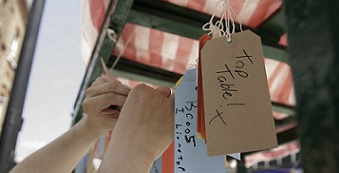Boost
Fantasy High Street and King’s College London

SME Partner Lydia Fraser-Ward, Fantasy High Street Academic Partner Dr Roberta Comunian, King’s College London Project In the follow up to their CEIR, Fantasy High Street (FHS) and King’s College London (KCL) collaboratively developed the Carrier Crows adventure trail – an RFID (Radio-Frequency Identification which refers to small electronic devices that consist of a small chip and an antenna) wristband project, which aimed to test the effectiveness of using a curated trail with digital touch-in points to a) encourage new wayfinding pathways around the local geographic area of Crystal Palace area including a local arts festival and high street and b) engage with the artistic content of the Crystal Palace Overground Festival, the case study for this research project. Fantasy High Street offered 100 people the chance to have an enhanced festival experience by following a trail of clues to festival events and participating high street shops. Festival-goers who wore trail wristband were able to navigate their way around the festival and local area by triggering clues from wristband readers (tablets) using hidden RFID sensors within the wristbands. When wristbands were touched-in, participants would receive clues to the next stop whilst also unlocking interactive experiences with artists or special discounts in shop locations. Audiences were advised that by participating in the free Carrier Crows adventure trail they would not only benefit from special added experiences and incentives that other festival-goers did not receive, but that they were also contributing to a data collection research project managed by Fantasy High Street and King’s College London. Participants were recruited through the festival’s general online and offline marketing as well as through the Fantasy High Street team that encouraged people face-to-face to take part through a highly visible registration marquee at the festival entrance where the registration and activation of wristbands took place. This research model mapped the frequency of wristband wearers’ movements from one stop on the to another which helped to indicate whether participants were compelled to follow the clues provided in a specific order, or respond to visual signage and maps to choose their own pathways. Although only a pilot with a relatively small number of participants, it was interesting to conclude that incentives were not enough to retain a large proportion of participants on a designed trail if the option to follow your own path by knowing the stops in advance was available. Ultimately audiences were keen to take up incentives (56% opted to redeem offers whilst there) – provided it was convenient to their general movement and plans for the day in the area. The BOOST Award enabled FHS to work with a digital tech company to trial new methods for interaction. This has fed into their development of their software packages, and its current limitations and has since influenced much of the new ideas Fantasy High Street has for digital interaction installations in the future. The collaboration with KCL began just as Fantasy High Street was starting up as a company; the business is now a registered CIC with an annual turnover of £45,000 in their second year of trading. As part of the BOOST Award project FHS took on a second employee for the summer period and employed numerous freelance staff members for the delivery of both projects funded by CWL. The relationship with CWL has introduced FHS to new potential partners, awoken creative ideas through discussion with other artists and academics and has provided a platform for them to talk about their work at conferences which has led to new potential partnerships. Following on from their collaborative work Kings College London is considering running a visiting cultural partners scheme; the BOOST project has helped to put in practice some of the ideas developed within the literature and also engaging with external organisations involving MA students.
— more schemes —
|
Creativeworks London is one of four Knowledge Exchange Hubs for the Creative Economy funded by the Arts and Humanities Research Council (AHRC) to develop strategic partnerships with creative businesses and cultural organisations, to strengthen and diversify their collaborative research activities and increase the number of arts and humanities researchers actively engaged in research-based knowledge exchange.